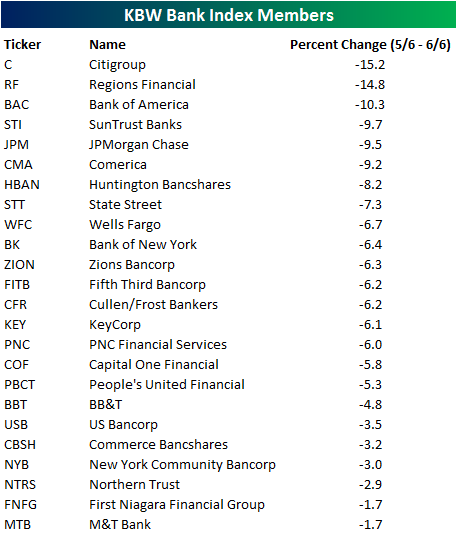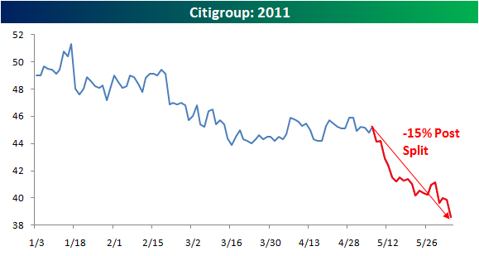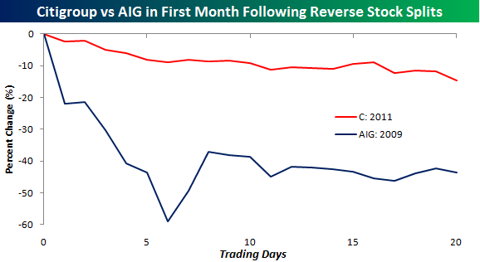Citigoup - wann einsteigen ?
auf eonen Kurssturz nach RS hingewiesen, jedoch hat jeder seine rosarote Brille aufgelassen.
Desweiteren gibt es jetzt gerade wieder beim Häusermarkt Imobilien
erhebliche Probleme!!
Citigroup hängt dort volkommen drinnen.
Desweiteren scheint auch die Schuldenproblematik und der Wachstumskurs ins stottern zu kommen.
Wenn der Konsument und der Gläubiger nicht mehr konsumieren oder zahlen können trifft es Citigroup extrem hart.
Sollte nur ein Bruchteil von dem zutreffen
wird Citigroup nochmals stark einbrechen!
Keine Kauf Verkaufempfehlung!!!
http://seekingalpha.com/article/...split-one-month-later?source=yahoo
Bank stocks fall on capital-requirement concerns
http://www.marketwatch.com/story/...cks-lower-2011-06-06?siteid=yhoof
Der Bericht zeigt eindrucksvoll, das der RS sehr wohl einen Einfluss auf den Kursverlauf gehabt hat! Wer das in den letzten 4 Wochen ignoriert hat, sollte dieses jetzt zur Kenntnis nehmen:
About a month has now passed since shares of Citigroup (C) reverse split on a one to ten basis, and judging by the early returns, management at the company may be wishing they reconsidered. While the reverse split was intended to help boost the bank's share price, the reality is that the opposite has occurred. In the four weeks of trading since May 6th (the last day that shares of C traded on a pre-split basis), shares of C are down by 15%.
Now, the last four weeks have not exactly been a bullish period for financial stocks, or for that matter any equities, but if we compare C's performance to its peers, the stock has still underperformed. Of the 24 companies in the KBW Bank Index, C is down more than any other stock (-15.2%).
 Finally, while shares of C have had a rough month since their reverse stock split, shareholders can take some solace in the fact that it could have been worse. The last notable Financial sector company to have a reverse split was AIG in July 2009. In the month after AIG's 1-20 split, the stock dropped by more than 40%. Since then, however, the stock has now risen by 150%.
Finally, while shares of C have had a rough month since their reverse stock split, shareholders can take some solace in the fact that it could have been worse. The last notable Financial sector company to have a reverse split was AIG in July 2009. In the month after AIG's 1-20 split, the stock dropped by more than 40%. Since then, however, the stock has now risen by 150%.
(Click charts to expand)
Source data: Seeking alpha - June 6, 2011
Verfall des Wertes. Nun, den können wir beinahe täglich sehen.
Was könnte sich kurzfristig noch dazu negativ auswirken:
http://online.wsj.com/article/BT-CO-20110606-702267.html
und interessant finde ich:
http://www.wellenreiter-invest.de/...iterWoche/Wellenreiter110604.htm
Banken
http://www.wirtschaftsblatt.at/home/international/...amp;_vl_pos=1.DT
amüsiert ihr euch gut mit der Citi? ;-)
Es hat ja nun hoffentlich niemand Aktien von irgendwelchen Banken gekauft, sonder immer nur schön Put Optionen, ja?
Ich hab es ja schon lange nicht mehr geschrieben, aber weils so schön ist: keine Banken Aktien für mich :-)
bis Pandit die nächste Rechnung präsentiert bekommt. Neben GS und JPM hat sich ja offenbar die C auch dabei hervorgetan, ganz excellente Geschäfte mit CDS auf Griechenland Bonds abzusschliessen. Die 23 Milliarden an CDS mit denen die Griechen auf ihren eigenen Untergang wetten ist ganz sicher nur die Spitze des Eisberges. Irgendwann werden die CDS fällig und ich bin sehr gespannt, wie die Bänkster dann ihre Rechnungen bezahlen wollen.
http://info.kopp-verlag.de/hintergruende/europa/...dergeschaefte.html
Bisher habe ich die Streiks in GR nicht verstanden, jetzt schon.....
Citgroup would need extra capital at $13 billion next year under a 10% capital target
By DEBORAH SOLOMON and RANDALL SMITH
Large U.S. financial institutions might be forced to sharply increase their capital cushions as part of a plan discussed by the Federal Reserve to help prevent another financial crisis.
Daniel Tarullo, governor of the U.S. Federal Reserve speaks during a Senate Banking hearing earlier this year.
In a speech on Friday, Federal Reserve governor Daniel Tarullo suggested institutions could be ordered to hold capital ranging from 8% to 14% of assets, adjusted for the amount of risk they pose.
No decision has been made, but in some extreme cases that would be twice as high as the 7% agreed to last year by global policy makers in Basel, Switzerland.
"The regulatory structure…should discourage systemically consequential growth or mergers unless the benefits to society are clearly significant," Mr. Tarullo said at the Peterson Institute for International Economics. "No one wants another TARP," he said, referring to the Troubled Asset Relief Program, the $700 billion government bailout that became necessary as financial institutions teetered on the brink of insolvency in 2008.
His comments come amid continuing international disagreement over the appropriate levels of capital for such "systemically important financial institutions," or SIFIs. International policy makers agree banks need stronger capital buffers to withstand market tremors but consensus tends to end there. U.S. policy makers, including Treasury Secretary Timothy Geithner, want an international agreement so U.S. firms aren't put at a competitive disadvantage by having to hold more of their capital in reserve.
In an interview on Friday, Michel Barnier, the European Union's financial-services commissioner, rejected the need for additional capital levels beyond those agreed to in Basel. "Let's not go too fast," he said. "We can't rush forward. We have to implement what we said we should."
The Fed, as part of the Dodd-Frank financial law passed last year, must impose stringent capital requirements on large, complex financial institutions that pose a risk to financial markets. About 35 banks with $50 billion or more in assets are automatically subject to the enhanced capital rules and regulators are discussing which other nonbanks, such as insurance companies, private-equity shops and hedge funds, also should fall into the SIFI category.
The Fed is considering a stricter capital regime than many on Wall Street expected. A leading idea among Fed staff would require the riskiest institutions—those whose collapse could cause the most collateral damage—to boost capital levels 100% above the Basel international standards, while less-risky institutions would need a 20% bump. That would translate into firms putting aside between 8.4% to 14% of capital. The Basel agreement requires institutions to slowly increase capital cushions to 7% by 2019 from roughly 2% now.
Banks would have to boost their capital reserves using common equity—a stricter form of capital than many want to use because it dilutes the outstanding shares. Mr. Tarullo said other forms of capital, such as contingent capital, which allows banks to convert debt instruments into equity in an emergency, are insufficient and potentially subject to "political pressures" in times of stress.
Mr. Tarullo said the U.S. needs to move beyond the Basel requirements because they are narrowly tailored to an individual institution's ability to withstand losses and don't take into account the "high degree of risk correlation among large numbers of actors in quick-moving markets." Tougher capital standards are necessary, he said, because systemically important institutions have "no incentive to carry enough capital to reduce the chances of such systemic losses."
Source data: WsJ online - June 4, 2011
So z. B. werden jetzt alle 100jährigen (warum nicht alle Pensionnisten ?) überprüft ob sie noch am Leben sind. Was haben die bloß für eine Verwaltung oder besser gesagt welch einen "Saustall" - und sollte man sich besser fragen, wer alles von solchen Misständen profitiert.
http://www.faz.net/artikel/C30638/...en-rente-fuer-tote-30433598.html
Deshalb würde mich interessieren ,ob es noch andere Quellen gibt.
Das Ganze klingt so ungeheuerlich, dass ich es - ohne weitere Quellen - nicht glauben kann.
RS verloren verliert Citigroup
auch 60% auf längere Zeit wo stünden wir dann??
Bei circa 20$!!
Faule Kredite ??
Wer hält das für möglich!
In Euro circa 13€ hört sich sehr viel
an aber möglich ist alles!!
Papiere würden vermutlich keine Probleme bereiten - entsprechendes Kuvert würde dies schon in die Wege bringen.
Aber Spaß beiseite - habe nun eine griechische Seite gefunden - aus der 1 Milliarde
wurden bislang 23 Milliarden - soweit ich hier den Überblick nicht verloren habe.
Ansonsten müssten wir Hein fragen, da er dies auch angedeutet hat.
http://www.microsofttranslator.com/...economy_0_22%2F03%2F2010_115787
auch andere Quellen:
http://www.propagandafront.de/173630/...en-auf-verlorenem-posten.html
Natürlich alles nicht seriös, obwohl die ja ziemlich oft schon recht haben ;-)
Übrigens ging das 2010 durch die Mainstream Presse, das die griechische Postbank für 1,3 Milliarden CDS zur Absicherung gekauft hatte, ist aber wohl in den Rettungs Billionen völlig untergegangen, Peanuts halt.
und dabei lesen ja angeblich so viele hier drinnen so viel artikel.
lesen vielleicht schon. aber verstehen sie diese auch? ich bezweifle das immer mehr.
finde es auch witzig, wenn ich zwei links reinstelle und keine halbe stunde später postet jemand anderer die gleichen links als vollkopie hier rein.
This Is Getting Absurd: Greece Speculated Against Itself
http://seekingalpha.com/article/...d-greece-speculated-against-itself
und ein kurs von 3.8 pre RS ist ja ganz normal.
habe ich mittlerweile Gewichtsprobleme, das nimmt einfach zu viel Platz weg. Zinsen bringt das auch keine das Mistzeug ;-)
Kann ich mir denken, weil die meisten eben nicht warhaben wollen, das Bankster und Politiker mittlerweile schlimmer agieren als Mafia Organisationen. Das wird noch sehr viel schlimmer kommen, da nur ein kleiner Teil von dem was die anrichten an die Öffentlichkeit gerät, auch auf Grund der nicht mehr recherchierenden Mainstream Medien, die einfach nur noch alles ungeprüft von Reuters kopieren. Kann man nur abwarten bis die sich endgültig ihr eigenes Grab schaufeln mit solchen Aktionen.

